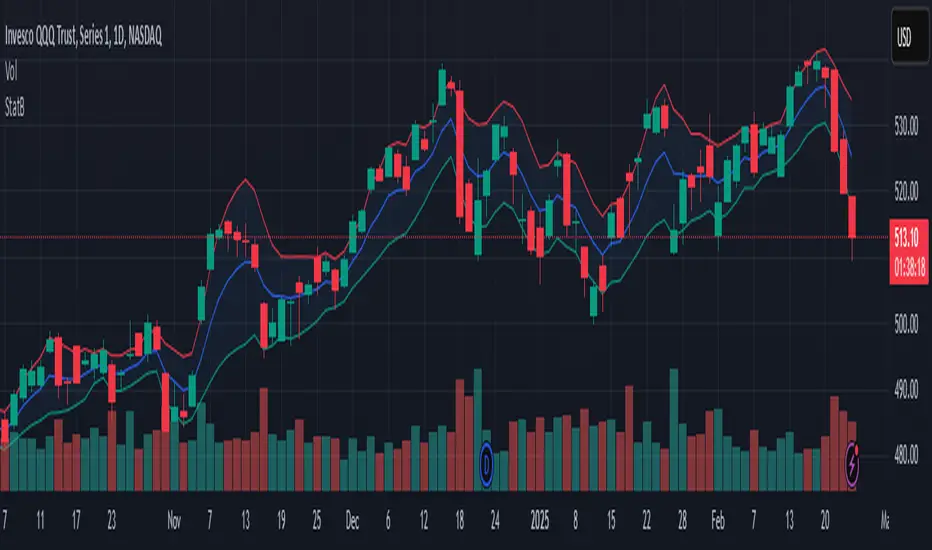PROTECTED SOURCE SCRIPT
Zaktualizowano Statistical Bands

This TradingView indicator, "Statistical Bands" (short title "StatB"), creates a dynamic envelope around a smoothed baseline by combining noise reduction techniques with volatility measurement. It offers several smoothing methods—including various moving averages and a Kalman filter option—and calculates upper and lower bands based on either standard deviation or ATR, allowing traders to visualize potential support/resistance and volatility levels.
Overview
Baseline Calculation:
The indicator computes a baseline from a user-selected source (typically the close price) and smooths it using a chosen algorithm. If the user selects “Kalman,” the script applies a Kalman filter (using user-defined parameters for measurement noise variance (R) and process noise variance (Q)); otherwise, it uses one of several moving averages (SMA, EMA, RMA, WMA, VWMA, or HMA).
Band Formation:
A statistical measure of volatility—either the standard deviation or the Average True Range (ATR)—is calculated over a specified length and then multiplied by a user-defined bandwidth multiplier. The upper and lower bands are obtained by adding or subtracting this value from the baseline.
Visualization:
The indicator plots the baseline and the two bands over the price chart and fills the area between the bands with a semi-transparent color, making it easier to identify potential breakout zones or areas of support and resistance.
This concise yet flexible tool aids traders in assessing current market conditions by highlighting volatility and potential turning points.
Overview
Baseline Calculation:
The indicator computes a baseline from a user-selected source (typically the close price) and smooths it using a chosen algorithm. If the user selects “Kalman,” the script applies a Kalman filter (using user-defined parameters for measurement noise variance (R) and process noise variance (Q)); otherwise, it uses one of several moving averages (SMA, EMA, RMA, WMA, VWMA, or HMA).
Band Formation:
A statistical measure of volatility—either the standard deviation or the Average True Range (ATR)—is calculated over a specified length and then multiplied by a user-defined bandwidth multiplier. The upper and lower bands are obtained by adding or subtracting this value from the baseline.
Visualization:
The indicator plots the baseline and the two bands over the price chart and fills the area between the bands with a semi-transparent color, making it easier to identify potential breakout zones or areas of support and resistance.
This concise yet flexible tool aids traders in assessing current market conditions by highlighting volatility and potential turning points.
Informacje o Wersji
Minor bug fixInformacje o Wersji
Input description fixInformacje o Wersji
MA bug fixInformacje o Wersji
BugfixInformacje o Wersji
Updated bandwidth formula to be calculated as standard deviation against selected baseline, not simple moving average. This should improve potential trading results.Skrypt chroniony
Ten skrypt został opublikowany jako zamknięty kod źródłowy. Można z tego korzystać swobodnie i bez żadnych ograniczeń — więcej informacji znajduje się tutaj.
Wyłączenie odpowiedzialności
Informacje i publikacje nie stanowią i nie powinny być traktowane jako porady finansowe, inwestycyjne, tradingowe ani jakiekolwiek inne rekomendacje dostarczane lub zatwierdzone przez TradingView. Więcej informacji znajduje się w Warunkach użytkowania.
Skrypt chroniony
Ten skrypt został opublikowany jako zamknięty kod źródłowy. Można z tego korzystać swobodnie i bez żadnych ograniczeń — więcej informacji znajduje się tutaj.
Wyłączenie odpowiedzialności
Informacje i publikacje nie stanowią i nie powinny być traktowane jako porady finansowe, inwestycyjne, tradingowe ani jakiekolwiek inne rekomendacje dostarczane lub zatwierdzone przez TradingView. Więcej informacji znajduje się w Warunkach użytkowania.